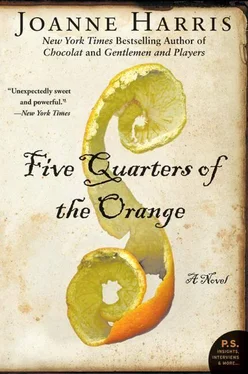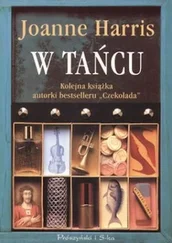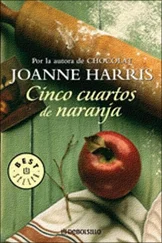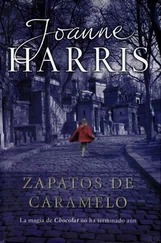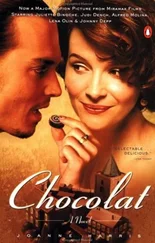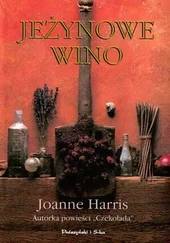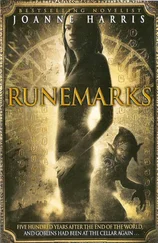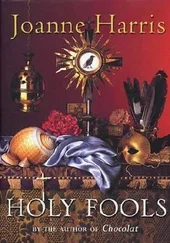No. Not this time. They’re going to take down every word. Can’t make them print it, of course, but by God, they’ll listen. I’ll make them do it.
My name is Framboise Dartigen. I was born right here, in the village of Les Laveuses, not fifteen kilometers from Angers, on the Loire. I’ll be sixty-five next July, baked and yellowed by the sun like a dried apricot. I have two daughters, Pistache, married to a banker in Rennes, and Noisette, who moved to Canada in ‘85 and writes to me every six months, two grandchildren who come to stay at the farm every summer. I wear black for a husband who died twenty years ago, under whose name I returned in secret to the village of my birth to buy back my mother’s farm-long abandoned, half gutted by fire and the elements. Here I am Françoise Simon, la veuve Simon, and no one would think to connect me with the Dartigen family who left in the wake of that dreadful business. I don’t know why it had to be this farm, this village. Perhaps I’m just stubborn. That was how it was. This is where I belong. The years with Hervé seem almost a blank now, like the strange calm patches you sometimes get in a stormy sea, a moment of waiting, of forgetfulness. But I never really forgot Les Laveuses. Not for a moment. Something in me was always here.
It took more than a year to make the farmhouse habitable. I lived in the south-facing wing, where at least the roof had held, and while the workmen replaced the roofing, tile by tile, I worked in the orchard-what was left of it-pruning and shaping and dragging down great wreaths of devouring mistletoe from the trees. My mother had a passion for all fruit except oranges, which she refused to allow in the house. She named each one of us, on a seeming whim, after a fruit and a recipe-Cassis, for her thick black-currant cake, Framboise, her raspberry liqueur, and Reinette after the reine-claude greengages that grew against the south wall of the house, thick as grapes, syrupy with wasps in midsummer. At one time we had over a hundred trees (apples, pears, plums, gages, cherries, quinces), not to mention the raspberry canes and the fields of strawberries, gooseberries, currants-the fruits of which were dried, stored, made into jams and liqueurs and wonderful cartwheel tarts on pâte brisée and crème pâtissière and almond paste. My memories are flavored with their scents, their colors, their names. My mother tended them as if they were her favorite children. Smudge pots against the frost, which we fed with our own winter fuel. Barrows full of manure dug around the base every spring. And in summer, to keep the birds away, we would tie shapes cut out of silver paper onto the ends of the branches that would shiver and flick-flack in the wind, moose blowers of string drawn tightly across empty tin cans to make eerie bird-frightening sounds, windmills of colored paper that would spin wildly, so that the orchard was a carnival of baubles and shining ribbons and shrieking wires, like a Christmas party in midsummer. And the trees all had names.
Belle Yvonne , my mother would say as she passed a gnarled pear tree. Rose d’Aquitaine. Beurre du Roi Henry . Her voice at these times was soft, almost monotone. I could not tell whether she was speaking to me or to herself. Conference. Williams. Ghislaine de Penthièvre. This sweetness .
Today there are fewer than twenty trees left in the orchard, though I have quite enough for my needs. My sour cherry liqueur is especially popular, though I feel a little guilty that I cannot remember the cherry’s name. The secret is to leave the stones in. Layer cherries and sugar one on the other in a widemouthed glass jar, covering each layer gradually with clear spirit (kirsch is best, but you can use vodka or even Armagnac) up to half the jar’s capacity. Top up with spirit and wait. Every month, turn the jar carefully to release any accumulated sugar. In three years’ time the spirit has bled the cherries white, itself stained deep red now, penetrating even to the stone and the tiny almond inside it, becoming pungent, evocative, a scent of autumn past. Serve in tiny liqueur glasses, with a spoon to scoop out the cherry, and leave it in the mouth until the macerated fruit dissolves under the tongue. Pierce the stone with the point of a tooth to release the liqueur trapped inside and leave it for a long time in the mouth, playing it with the tip of the tongue, rolling it under, over, like a single prayer bead. Try to remember the time of its ripening, that summer, that hot autumn, the time the well ran dry, the time we had the wasps’ nests, time past, lost, found again in the hard place at the heart of the fruit…
I know. I know. You want me to get to the point. But this is at least as important as the rest, the method of telling, and the time taken to tell… It has taken me fifty-five years to begin. At least let me do it in my own way.
When I came back to Les Laveuses I was almost sure no one would recognize me. All the same I showed myself clearly, almost brazenly, about the village. If someone did know me, if they managed to distinguish in my features those of my mother, then I wanted to know it immediately. I wanted to know where I stood. I walked to the Loire every day and sat on the flat stones where Cassis and I had fished for tench. I stood on the stump of the Lookout Post. Some of the Standing Stones are missing now, but you can still see the pickets where we hung our trophies, the garlands and ribbons and Old Mother’s head when we finally caught her. I went to Brassaud’s tobacconist’s-his son runs it now, but the old man is still alive, his eyes black and baleful and aware-to Raphaël’s café, the post office where Ginette Hourias is postmistress.
I even went to the war memorial. On one side, the eighteen names of our soldiers killed in the war, beneath the carved motto Morts pour la patrie . I noticed that my father’s name has been chiseled off, leaving a rough patch between Darius G. and Fenouil J.-P . On the other side, a brass plaque with ten names in larger letters. I did not need to read them. I know them by heart. But I feigned interest, knowing that inevitably someone would tell me the story, perhaps show me the place against the west wall of Saint-Benedict’s, tell me that every year there was a special service to remember them, that their names were read out from the steps of the memorial and flowers laid out…I wondered whether I could bear it. I wondered whether they would know from my face.
Martin Dupré. Jean-Marie Dupré. Colette Gaudin. Philippe Hourias. Henri Lemaître. Julien Lanicen. Arthur Lecoz. Agnès Petit. François Ramondin. Auguste Truriand . So many people still remember. So many people with the same names, the same faces. The Families have stayed here, the Hourias, the Lanicens, the Ramondins, the Duprés. Sixty years later they still remember, the young coached in casual hatred by the old.
There was some interest in me for a time. Some curiosity. That same house. Abandoned since she left it, that Dartigen woman, I can’t quite remember the details, madame, but my father-my uncle -Why had I bought the place, anyway, they asked? It was an eyesore, a black spot. The trees that were still left standing were half rotten with mistletoe and disease. The well had been concreted over, filled in with rubble and stones. But I remembered a farm neat and thriving and busy, horses, goats, chickens, rabbits… I liked to think that perhaps the wild ones that ran across the north field might be their descendants, occasionally glimpsed patches of white among the brown. To satisfy the curious, I invented a childhood on a Breton farm. The land was cheap, I explained. I made myself humble, apologetic. Some of the old ones viewed me askance, thinking, perhaps, that the farm should have stayed a memorial forever. I wore black and hid my hair beneath a succession of scarves. You see, I was old from the beginning.
Читать дальше
